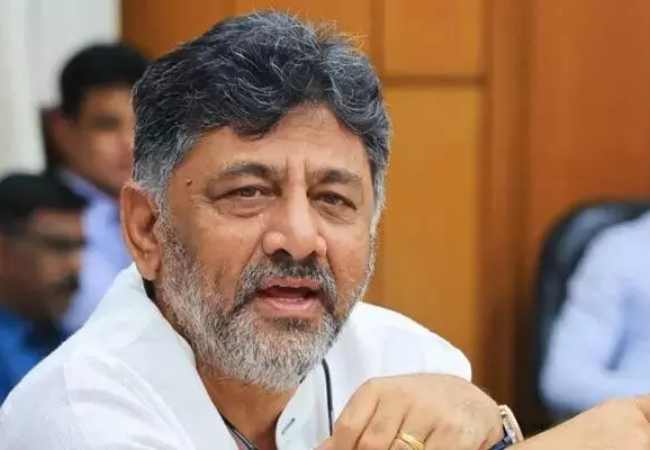Raipur, Jun 25 (PTI): A lawyer and his wife have been arrested here for allegedly killing a 58-year-old man over a monetary dispute, and dumping the body after stuffing it in a bag filled with wet cement, police said on Wednesday.
Lawyer Ankit Upadhyay (31) and his wife Shivani Sharma (24) allegedly conspired to kill Kishore Paikara, Upadhyay's client. Paikara had been demanding that Upadhyay return Rs 30 lakh borrowed from him, Raipur Senior Superintendent of Police (SSP) Lal Umed Singh told reporters.
Vinay Yadu (23) and Suryakant Yadu (21) were also arrested for allegedly helping the couple dispose of the body, he said.
Paikara was killed at a rented house in Indraprastha Colony on the morning of June 21, said Singh.
The body was discovered on the morning of June 23 after some passersby reported foul smell emanating from a big trunk left on the roadside near Diprapara drain in the same area. Police found a red trolley bag inside.
The victim, his legs tied and the throat slit, was encased in cement inside the trolley bag.
Five teams of the Anti-Crime and Cyber Unit and D D Nagar Police Station were formed to probe the case, SSP Singh said.
CCTV footage showed that three men and a woman had transported the trunk in the boot of a car from Indraprastha Colony.
The accused had fitted the car with a fake number plate, but the police still identified its owner who said he had sold it to Ankit Upadhyay, a resident of Satyam Vihar Raipura.
The police also found that the trunk had been purchased from Gole Bazar area and payment made online through Shivani Sharma's account. It had been transported to a house in Indraprastha Colony in an e-rickshaw.
The house owner told police that Upadhyay and his wife had rented it only a week ago.
The couple, in the meantime, fled to Delhi by a flight on the night of June 23. Raipur police immediately alerted their Delhi counterparts, and the two were taken into custody at the airport after they landed in the national capital.
Upadhyay told police that apart from being a lawyer, he sells and purchases land, and had helped Paikara sell his house in Bajrang Nagar here for Rs 30 lakh.
He had then borrowed the amount from Paikara for some personal work. The victim was demanding it back, which allegedly led to the conspiracy to murder him.
Upadhyay allegedly bought a second-hand car using a fake Aadhaar card which he himself had fabricated, and rented a house in Indraprastha Colony. On June 21, Upadhyay drove Paikara, who could not walk, in his car to the rented house where the couple allegedly murdered him by slitting his throat with a knife, SSP Singh said.
After disposing of the body on June 23, they fled to Delhi the same night.
The Alto car used in the crime, two two-wheelers, and five mobile phones have been seized from the possession of the accused, Singh said, adding that further probe was on.
Let the Truth be known. If you read VB and like VB, please be a VB Supporter and Help us deliver the Truth to one and all.
Bengaluru (PTI): Karnataka has proposed a new Information Technology Policy for 2025–2030, offering extensive financial and non-financial incentives aimed at accelerating investments, strengthening innovation and expanding the state's tech footprint beyond Bengaluru.
The Karnataka Cabinet gave its nod to the policy 2025–2030 with an outlay of Rs 445.50 crore on Thursday after the Finance Department accorded its approval.
The policy introduces 16 incentives across five enabler categories, nine of which are entirely new, with a distinctive push to support companies setting up or expanding in emerging cities.
Alongside financial support, the government is also offering labour-law relaxations, round-the-clock operational permissions and industry-ready human capital programmes to make Karnataka a globally competitive 'AI-native' destination.
According to the policy, units located outside Bengaluru will gain access to a wide suite of benefits, including research and development and IP creation incentives, internship reimbursements, talent relocation support and recruitment assistance.
The benefits also include EPF reimbursement, faculty development support, rental assistance, certification subsidies, electricity tariff rebates, property tax reimbursement, telecom infrastructure support, and assistance for events and conferences.
Bengaluru Urban will receive a focused set of six research and development and talent-oriented incentives, while Indian Global Capability Centres (GCCs) operating in the state will be brought under the incentive net.
Incentive caps and eligibility thresholds have been raised, and the policy prioritises growth-focused investments for both new and expanding units.
Beyond incentives, the government focuses on infrastructure and innovation interventions.
A flagship proposal in the policy is the creation of Techniverse -- integrated, technology-enabled enclaves developed through a public-private partnership model inside future Global Innovation Districts.
These campuses will offer plug-and-play facilities, artificial intelligence and machine learning and cybersecurity labs, advanced testbeds, experience centres, and disaster-resistant command centres.
There will also be a Statewide Digital Hub Grid and a Global Test Bed Infrastructure Network, linking public and private research and development, and innovation facilities across Karnataka.
The government has proposed a Women Global Tech Missions Fellowship for 1,000 mid-career women technologists, an IT Talent Return Programme to absorb experienced professionals returning from abroad, and broad-based skill and faculty development reimbursements.
Shared corporate transport routes in Bengaluru and tier-two cities will be designed with Bengaluru Metropolitan Transport Corporation and other transport entities to support worker mobility.
The government said the policy is the outcome of an extensive research and consultation process involving TCS, Infosys, Wipro, IBM, HCL, Tech Mahindra, Cognizant, HP, Google, Accenture and NASSCOM, along with sector experts and stakeholder groups.
It estimates an outlay of Rs 967.12 crore over five years, comprising Rs 754.62 crore for incentives and Rs 212.50 crore for interventions such as Techniverse campuses, digital grid development, global outreach missions and talent programmes.





